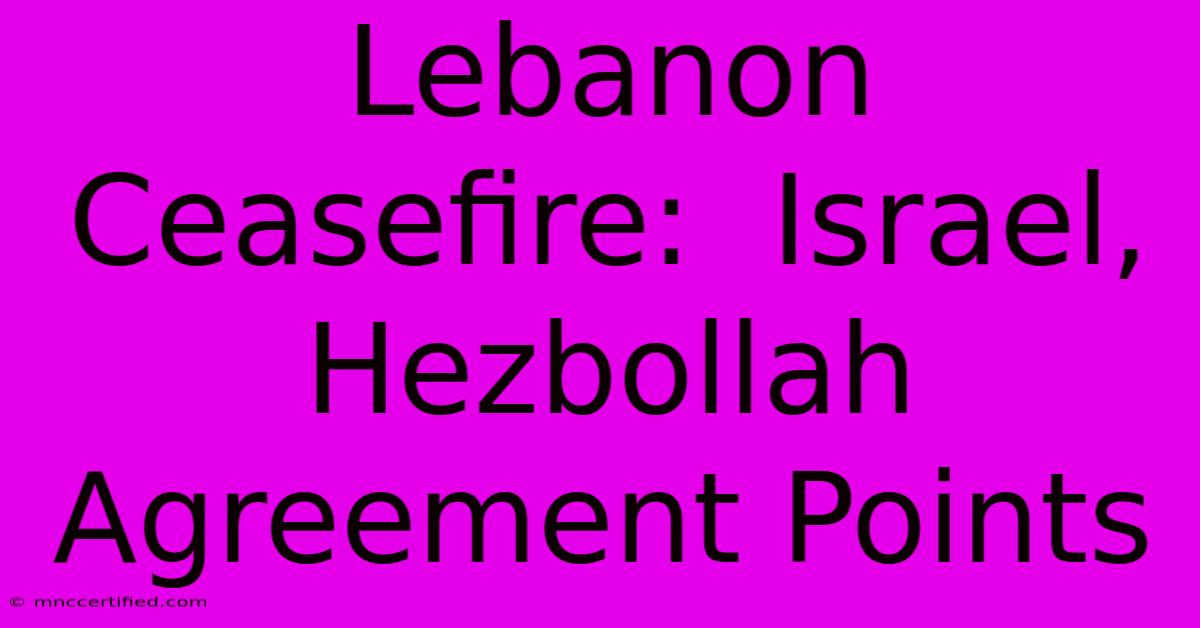Lebanon Ceasefire: Israel, Hezbollah Agreement Points

Table of Contents
Lebanon Ceasefire: Key Points of the Israel-Hezbollah Agreement
The recent escalation of violence between Israel and Hezbollah in Lebanon culminated in a fragile ceasefire. While details remain scarce and officially unconfirmed, various reports and statements offer insights into the key points of this tentative agreement. Understanding these points is crucial to analyzing the situation's implications for regional stability. This article will delve into the purported agreement points, analyzing their significance and potential challenges.
Key Reported Points of the Ceasefire Agreement
It's vital to preface this section by stating that the information presented below is based on reports from various news agencies and analysts. No official joint statement detailing the agreement's specifics has been released by either Israel or Hezbollah. Therefore, consider this information as an overview of the prevailing narrative, not definitive confirmation.
1. Mutual De-escalation:
This is arguably the most fundamental aspect. Both sides reportedly agreed to cease hostilities, ending the cross-border shelling and rocket fire that characterized the recent conflict. This de-escalation is a crucial first step towards restoring a degree of stability to the volatile border region. The success of this point hinges on the commitment of both parties to uphold the ceasefire.
2. Potential Prisoner Exchange:
Reports suggest a potential prisoner exchange as a significant element of the agreement. This could involve the release of Lebanese prisoners held by Israel in exchange for Israeli citizens or bodies held by Hezbollah. Such exchanges have been a feature of past conflicts and could help build confidence and facilitate further dialogue. However, the specifics of any such exchange remain unclear and heavily dependent on negotiations.
3. Indirect Mediation:
The ceasefire appears to have been facilitated through indirect mediation, possibly involving international actors such as the United Nations or other regional powers. This underscores the vital role of international diplomacy in managing crises in the Middle East. The success of this indirect mediation highlights the need for continued diplomatic engagement to solidify the agreement and address underlying tensions.
4. UNIFIL's Enhanced Role:
The United Nations Interim Force in Lebanon (UNIFIL) is expected to play a more active role in monitoring the ceasefire and preventing future escalations. This may involve increased patrols along the border and closer cooperation with both sides to ensure compliance. The effectiveness of UNIFIL’s enhanced role will be crucial in preventing further violence. This point directly addresses concerns regarding border security and stability.
5. Addressing Underlying Issues:
While not explicitly detailed in reports, the ceasefire agreement likely implicitly acknowledges the need to address the underlying issues fueling tensions between Israel and Hezbollah. These include the ongoing dispute over Lebanon's southern border and the broader regional geopolitical dynamics. Failure to address these long-term issues could jeopardize the sustainability of the ceasefire. This will require sustained diplomatic effort and a willingness to engage in constructive dialogue.
Challenges and Uncertainties
Despite the apparent agreement on de-escalation, several significant challenges remain:
- Verification and Enforcement: Verifying compliance with the ceasefire and enforcing its terms will be a major challenge. Both sides have a history of violating ceasefires, so robust monitoring mechanisms are essential.
- Long-Term Sustainability: The ceasefire's long-term sustainability depends on addressing the root causes of the conflict and building lasting trust between Israel and Hezbollah. This will require a significant commitment to diplomatic engagement and conflict resolution.
- Regional Implications: The ceasefire's impact on regional dynamics is uncertain. Other actors in the region may seek to exploit the situation or further destabilize the fragile peace.
Conclusion: A Fragile Peace
The Lebanon ceasefire represents a fragile step towards de-escalation, but its success hinges on the commitment of all parties to uphold the agreement's terms and address the underlying causes of the conflict. The coming weeks and months will be crucial in determining whether this ceasefire marks a genuine turning point or simply a temporary pause in a protracted conflict. The international community's role in supporting the ceasefire and fostering dialogue between the involved parties will be instrumental in determining the outcome. Continued monitoring of the situation and careful analysis of official statements (when released) are necessary for a complete understanding of this developing story.

Thank you for visiting our website wich cover about Lebanon Ceasefire: Israel, Hezbollah Agreement Points. We hope the information provided has been useful to you. Feel free to contact us if you have any questions or need further assistance. See you next time and dont miss to bookmark.
Featured Posts
-
Ucl Aston Villa Starting Xi Vs Juventus
Nov 28, 2024
-
Jedediah Starr Trading Company
Nov 28, 2024
-
Wsl Aston Villa Black Friday Ticket Deals
Nov 28, 2024
-
College Football Trading Cards
Nov 28, 2024
-
Lala Ariana And Andy Vpr Shakeup
Nov 28, 2024